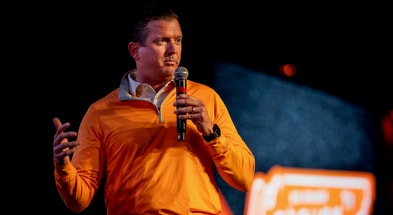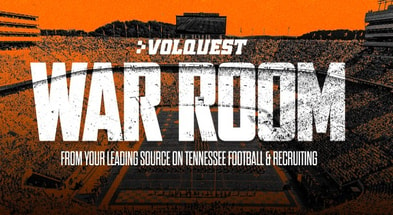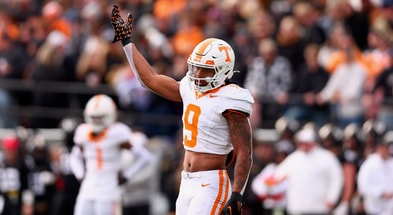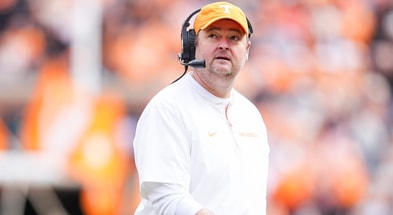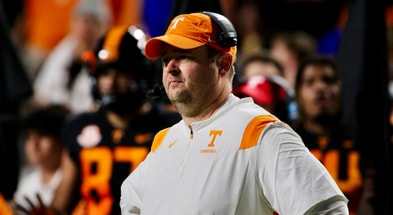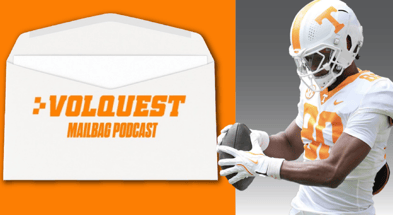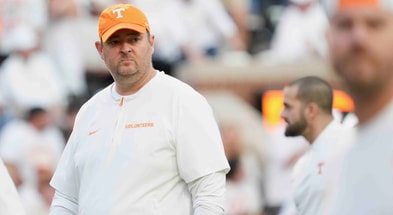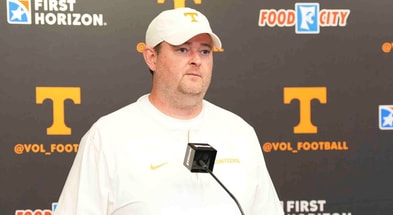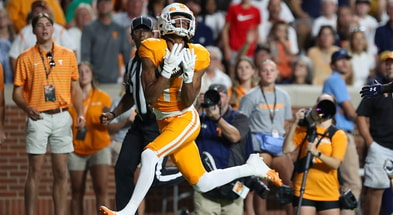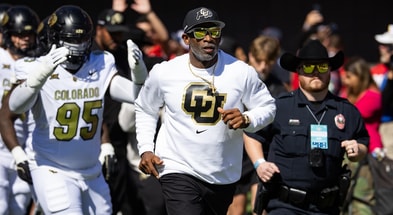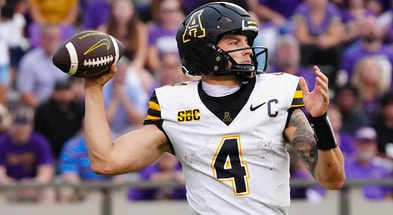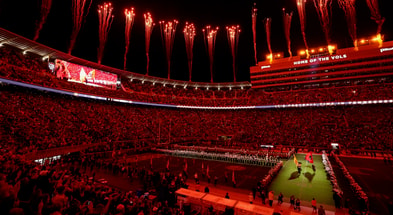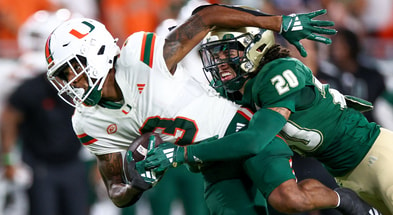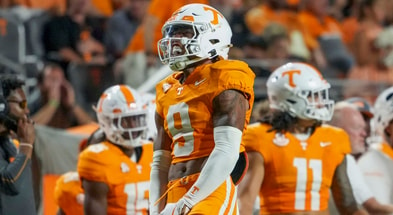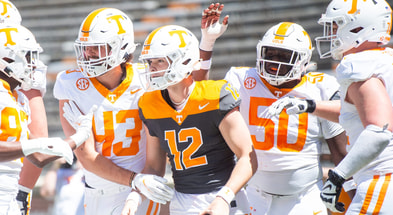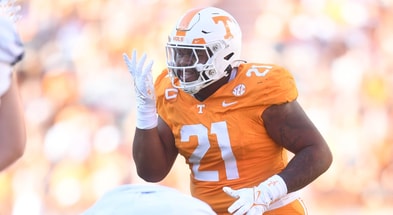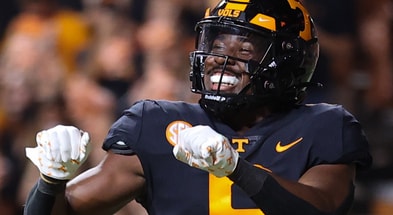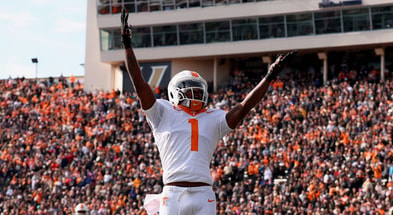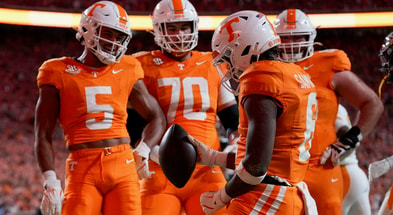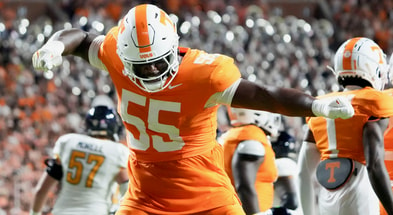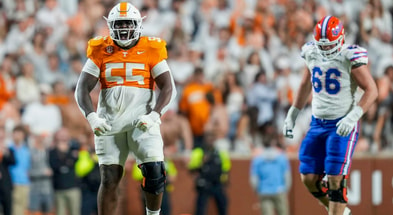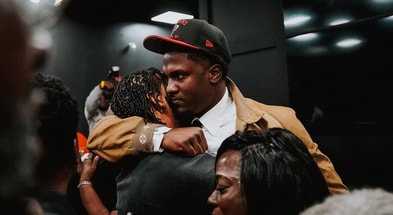After 50 years of broadcasting, Bob Kesling set to retire

In 1972, Bob Kesling arrived on Tennessee’s campus after a chance meeting with then Tennessee head coach Bill Battle, which landed him on the football team. One year as a Tennessee football player ultimately led to a 50-year broadcasting career that will end this spring, with Kesling set to retire at the end of the basketball season.
“The last five years I have, and my wife, Tami, we have kind of sat and evaluated at the end of each basketball season, ‘Do you want to keep doing this?’ Do you want to spend more time with your grandkids?” Kesling said. “I kept saying I still had the passion and the energy. I still love doing the games and going to the stadium. I still love being around the players. Broadcasting these games is the next best thing to playing because you still get the butterflies. As long as I had that passion I wanted to keep doing it.
“We took it year by year, and we came to this this summer. I had been through all the surgeries with my knee and my shoulder. I just couldn’t commit to the University for the long haul. I couldn’t commit that I was going to be here the next five years and, the more I thought about it, we have our fifth grandchild coming. I have been gone basically every weekend since 1972 going to games. That’s a lot of time I have been away from my family and Tami. I missed a lot of things.
“I talked with the folks at UT and to (Vol Network general manager) Steve Early. You never know when the perfect time is and you don’t want to stay too long. Luckily, my health is good and I just decided if I can’t commit to five more years, then I need to think about getting out when the getting is good.”
For Kesling, an Ohio native, the five-decade career in the business has been the result of hard work creating opportunities. He’s never applied for a job in his entire career. He’s followed the advice of his two mentors and the result has been a hall of fame career.
“John Ward always told us he didn’t want us excited about the Alabama game, he wanted us prepared. That’s the way I have tried to approach it,” Kesling recalled sitting in his office this week pouring over game notes and completing his spotting board for Saturday night’s game against Mississippi State. “I learned so much, sitting next to him for 15 years spotting for him, about the mechanics of a broadcast.
“Lindsey Nelson always told me, ‘You are going to get one break in this business. Are you ready for the break? Have you worked hard enough for the break?’ I have always remembered that. Because you see some other guys that maybe get similar opportunities that I have had, but they didn’t work. I always tried to pride myself on getting better every day. I had been prepared from Ward, and you only get one break, you better work hard. Those were two things that really drove me when I was young and trying to figure out what I was doing.”
Kesling’s life goal coming out of high school was to do something in sports. Broadcasting, however, wasn’t the goal, but neither was attending Tennessee. Kesling came to Knoxville with a high school friend who was trying to see head coach Ray Mears about being a part of the Tennessee basketball program. Kesling decided to see what Tennessee football was all about.
“I just walked into Coach Battle’s office unannounced,” Kesling said. “His secretary was sitting there and I asked what it took to walk on the football team. She said, ‘I don’t know, do you want to talk to Coach (Bill) Battle?’ So, five minute later, I’m in Coach Battle’s office talking to him. I didn’t have a transcript or any film with me but he was great. They were recruiting a guy on my high school team, Chet Moeller, who later went to Navy, and is in the College Football Hall of Fame now. So, Coach Battle knew about our team. He walked me down to the freshman running back room to meet the coaches. They took me back down to Coach Battle’s office and he handed me a workout sheet and said, ‘If you can get in school, we would love to have you.’
“I knew after my freshman year, I wasn’t going to be a big-time star or anything, and it was time to get on to something else and I was lucky enough to get into broadcasting.”
That luck was created by finding an opportunity through a chance meeting with the owner of the Knoxville Sox minor league team 50 years ago.
“There were four of us college students in August who went to Bill Meyer Stadium to watch the old Knoxville Sox play and an usher threw us out of our seat because we were sitting in the box seats and had just paid for regular seats. We were outraged college kids!
“There were 500 people there and they wouldn’t let us sit behind the dugout and cheer on the team. I went storming into the office and the owner of the team Neal Ridley was in there. I don’t know how the conversation started but before I walked out of there that night I talked myself into a summer job working for the Knoxville Sox. That was in 1974.”
Kesling, while working with the Sox, recorded 30-second voice reports that he sent out to stations to use. WIVK was one of those stations that ran the report and they called him to offer him a job, which is how Kesling got into broadcasting full time.
It was another meeting at the ballpark that landed Kesling with the Vol Network.
“Ernie Robertson filmed all the football games and put the coaches’ shows together with John Ward, but Ernie loved baseball and he would come to the Knoxville Sox games and film the pitchers. My connection with Ernie through the Sox got me the opportunity to be the film editor for the Bill Battle TV show.
Top 10
- 1New
Johntay Cook
Headed to ACC
- 2Hot
Fan who fell from stands
20-year old former CFB player
- 3Trending
Donald Trump
Wants Saban back as Alabama HC
- 4
Kentucky, St. John's
Set to play in 2025-26
- 5
Bracketology
Way Too Early Tournament projection
Get the On3 Top 10 to your inbox every morning
By clicking "Subscribe to Newsletter", I agree to On3's Privacy Notice, Terms, and use of my personal information described therein.
“In 1976, John Ward needed a spotter. I was still in school, but he knew that I had played football so he asked me if I wanted to spot for him, which is how I got that job.”
That job started Kesling towards a 23-year journey that, in 1999, saw Kesling land the challenge of replacing the legendary Voice of the Vols.
“John never talked to me about the job,” Kesling said. “He never discouraged me or encouraged me to pursue the job. He never said anything. Without him saying anything to me, I felt it was a vote of confidence that he felt I could do it. He didn’t tell me not to take it so that was a vote of confidence. I felt because of the fact that I had been around Knoxville for so long that I had some name recognition. Being on Jefferson-Pilot (the SEC TV package at the time) I think helped my name recognition so at least people knew who I was. I wasn’t some outsider coming in who was going to try and change everything. I had been on the (Vol) Network for so long that there was some comfort level with most people. That’s not to say people didn’t miss John Ward and I didn’t say the same phrases he said and my tempo wasn’t the same as his, and they weren’t going to like me. I understood that.
“Doug Dickey took me to lunch and he told me that there were going to be some people that tell you that you are the greatest announcer that ever lived and that’s not true. Then you got some that will say that you are the worst announcer and that’s not true. He said you don’t need to worry about what any of those people say, you just go do the best job you can and the only person you have to please is me. As long as you keep me happy, you are good. That was one of the best things he could have told me.”
Kesling called his first on September 4, 1999 and got a clear reminder of what he had gotten himself into.
“The day of the first game, I’m walking to the stadium and there’s some guy in an ice delivery truck. He drives by and says ‘Hey Bob, good luck tonight, don’t embarrass us’. I said, ‘I got you, thanks.’ I’m not going to lie. I was nervous and anxious,” Kesling said with a chuckle.
Saturday, Kesling will call his 322nd Tennessee football game. He will do so the same way he has done it since 1999 in his style and with pride.
“One of the first things I did when I got the job to replace John, I got in the car and I drove across the state and visited every single Vol Network station. I called them and said if you want me to go speak to a Rotary club, if you want me to go see some of your advertisers, if you just want to show me your town I would love to get to know you. It was amazing to me what a big deal they thought that was. The power and the brand of the Vol Network was like royalty was coming to town. The farther away you get from Knoxville the bigger and more important the Power T and the Vol Network is to people. The pride and the tradition of the Vol Network really shined through to me when I made those stops to every single station on the network. It’s just such an important thing to people and it’s been that way for decades.”
For Bob Kesling, the last five decades have been about pride. Pride in a career that happened when preparation met opportunity.
“It’s amazing,” Kesling said. “I came here in 1972 not knowing anyone in Tennessee, scared to death as a freshman walk-on fullback, and here I am over 50 years later with so many friends because of this position. I’m really overwhelmed with just how fortunate I have been. What a great ride it’s been.”

